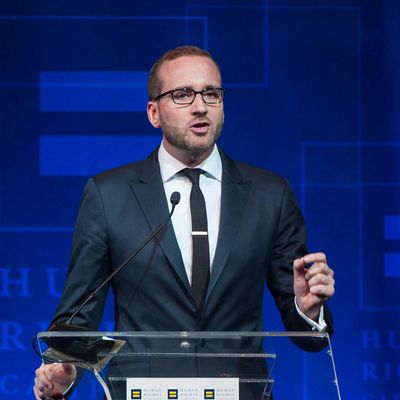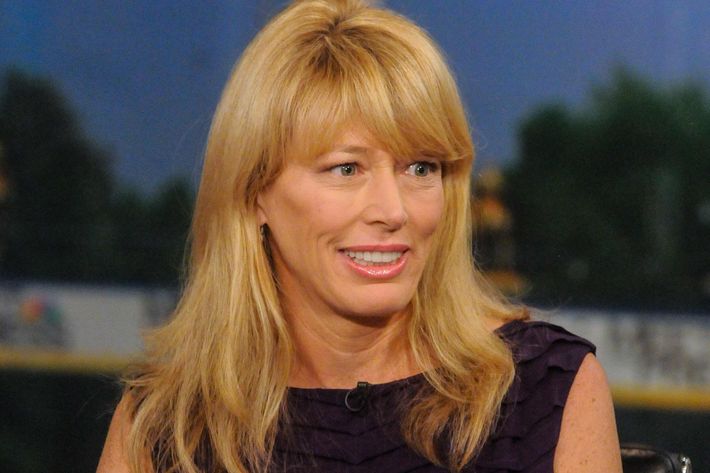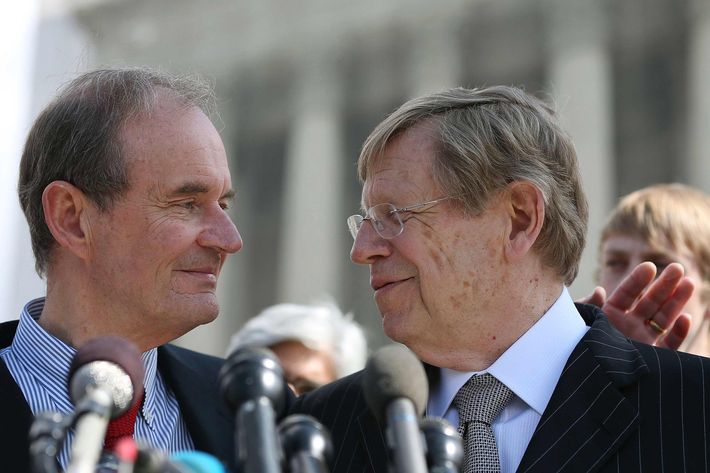
The nightmare imagined by every author is that her book will go entirely unnoticed when it is published, but the opposite experience — of sudden, impassioned, relentless attention — can be unsettling too. Last week, the political journalist Jo Becker published Forcing the Spring, an account of the iconic marriage-equality court case Hollingsworth v. Perry, and almost immediately found her book under vigorous attack from many of the most prominent figures in the gay rights movement. This was surprising, especially to Becker, in part because her book had been reviewed very prominently and very positively in the mainstream press, but even more so because her account was obviously on the side of the advocates for gay marriage, whom she had described in heroic terms. Still, Andrew Sullivan accused Becker of “jaw-dropping distortion,” and there were similarly sharp critiques from Michelangelo Signorile, from Dan Savage, from Chris Geidner. They accused Becker of overhyping the importance of the Hollingsworth v. Perry case and inflating the role of her book’s protagonist, the activist and political operative Chad Griffin, played in the marriage-equality fight (the book’s third sentence compares him to Rosa Parks), while ignoring others or treating them with, as Geidner put it, “outright animosity.”
Once the furor had begun among gay intellectuals (“things are white-hot right now,” a leading gay rights professional told me last week), it quickly spread to the mainstream progressive media. The estimable public-radio host Terry Gross, who had already recorded an interview with Becker, summoned the journalist back into her studio to respond to the controversy. What Becker might have expected to be a soft interview on Ronan Farrow’s MSNBC show turned pretty combative. Plans were made to protest a reading Becker had scheduled in San Francisco. The subjects of her story wrote hasty, apologetic open letters to The Advocate and got themselves booked onto MSNBC to defend Forcing the Spring; movement elder statesmen wrote considered essays asking everyone to please simmer down. Becker is a pro (a Pulitzer winner at the Washington Post, now at the New York Times), but when I spoke to her toward the end of last week, when she was still in this vortex, she had a slightly brittle, defensive quality — not post-traumatic, quite, but a more muted and managed version of that. In interviews with me and with others, Becker insisted that she had meant her book only as one story among many about the marriage-equality movement, that she was being blamed not for the story she had told, but for not telling other stories.

Part of the testiness over Becker’s book is petty but inevitable legacy-jockeying. It’s not yet clear who will be seen as the Thurgood Marshall of the marriage-equality movement, or its Rosa Parks, but the list of candidates is not very long, and everyone in the movement knows who is on it.
But as it has unfolded, this fight has increasingly seemed like a proxy for another argument, far more interesting and meaningful, in which Becker has been collateral damage. When I spoke on background with some of Becker’s critics, they tended to spend far less time talking about the book than about Chad Griffin. The fight for full gay equality turned so rapidly during the past five years that even within the movement there seems to be no real consensus about who or what caused the change, or what its nature truly was. Becker’s book contained a hypothesis of a sort — that you could draw a straight line between the activists who pursued the Hollingsworth v. Perry case all the way through to President Obama’s conversion to the cause, that the movement had stagnated before Griffin revived it. Which is just a way of saying that the argument about Forcing the Spring may always have been about something else: It has been about Chad Griffin.
Griffin had nothing to do, it is worth stipulating here, with the most recognizable success of the marriage equality movement during the past five years. The lawsuit that led to the Supreme Court overturning the federal Defense of Marriage Act was first filed in New York, in 2009, by an attorney named Roberta Kaplan. Organizers and grassroots have worked for years on lobbying and lawsuits to legalize same-sex marriage in the States, and over the past five years, the number of states where they have won has expanded from 2 to 16.
Hollingsworth v. Perry was a California lawsuit — a petition to the federal government that insisted that the Golden State’s ban on gay marriage was unconstitutional, and eventually won — and Griffin’s story was, at its outset, a California story. Forcing the Spring begins at the end of 2008, during a contradictory moment for gay progressives, especially those in California. Obama had just been elected president, largely by a young and diverse and tolerant electoral base, and yet California’s voters had passed Proposition 8, a ballot initiative that took away the right to same-sex marriage in the state. The prevailing wisdom among the marriage-equality groups (and also among the larger gay rights organizations, which had come more recently to focus on marriage as an issue) was that the movement needed to proceed systematically, fighting for initiatives and laws in the states, laying the political groundwork for what would be an eventual but distant move for marriage equality on the federal level. Some of the marriage-equality movement’s engineers — like the lawyers Evan Wolfson, now of Freedom to Marry, and Mary Bonauto — had been working on it for more than a decade, taking gay marriage from a dismissed hypothetical to reality. But after Proposition 8 passed, there was a growing sense of agitation from the grassroots that the movement was not being aggressive enough, that full equality was taking far too long.
Which is when Griffin, then operating a small political consultancy in Los Angeles, began to hold meetings. “He was an outsider,” Becker said to me, explaining how she saw Griffin and his cohort at the outset of her story. “Leading a band of outsiders who were frustrated with the status quo.” This is true in one important way: Griffin, in his mid-30s at the time, had no status within any established gay organization. It is untrue in virtually every other way. A kid from Hope, Arkansas, Griffin had begun working in the Clinton White House at 19 years old, when he had not yet come out as gay, and had become by Obama’s election very well connected, adept at manipulating small rooms filled with exceedingly powerful people. He managed to convince a small group of influential liberal donors (the Hollywood producer Rob Reiner chief among them) to foot the bill for a challenge to Proposition 8 in federal court, one that he hoped would lead the Supreme Court to overturn all bans on same-sex marriage.
Griffin found out that the Republican former solicitor general Ted Olson sympathized with the cause of gay marriage (a contact of Griffin’s turned out to be Olson’s ex-sister-in-law) and convinced the superlawyer to take the case, along with David Boies, who had opposed Olson as the lead Democratic counsel in Bush v. Gore. From the outset, the media attention given to this particular case has been extreme, and the interest is likely to continue: Boies and Olson are writing their own memoir about the case, to be published this summer, and Griffin’s group will also be the subject of an HBO documentary in June. Griffin himself has become the executive director of the Human Rights Campaign, the largest gay rights lobby in Washington — an insider’s insider. “Like hiring the general of an opposing army,” the longtime gay rights advocate Richard Socarides says in Forcing the Spring.

I was at the press conference that Griffin called to introduce the case, and Olson and Boies, in the Biltmore Hotel in Los Angeles in 2009. It had a weird vibe. Griffin could seem openly disdainful of the major gay organizations, many of which had opposed this lawsuit, worrying that it was too premature and would set the movement back. Neither Olson nor Boies had any previous connection to the gay rights movement, but they were the focus, and they seemed mostly devoted to their own jocular shtick, about coming together despite their partisan differences, the way awkward business partners will say they have learned to forgive each other despite one going to Harvard and the other to Yale. (The attorneys evidently share an enthusiasm for very expensive, very fine wines.) It was the opposite of movement-y.
I met and interviewed Griffin only briefly during this time, but I thought of him as a basically discordant presence in the movement. He seemed to have the cynical certainty that you often find among lifelong political operatives though rarely among politicians themselves, that real political power is a negotiation among elites, that grassroots movements are a sideshow. Becker clearly admires her subject, sometimes so much that it has made even Griffin’s allies wince. (“Way too positive,” one of Griffin’s close allies said to me. “Too many adjectives and adverbs.”) But her book is sharply observed, and he often comes across as a neurotic, entitled, combative figure. Early in the book, Griffin argues with established gay organizations who oppose his strategy to go national, and as the book goes on, he grows triumphant. “There’s no ‘Fuck you to Ted and Chad from the ACLU’?” Griffin crows to Olson at one point, while the lawyer is reading a favorable court decision. Flying back from one hearing, he insists that the legal team fly in two separate private planes, lest one go down and take the cause with it.
This aesthetic may explain some of why the case against Becker’s book has had so much traction among the progressive media generally. Liberals have instinctively sided with the longtime activists who spent years plodding through signature drives and ballot initiatives they were bound to lose, rather than the political consultant with the private jets and the Hollywood connections who made the movement’s public face two old, white, straight lawyers. “[Becker] describes marriage equality as an issue that had languished in obscurity until 2008 when Chad Griffin, David Boies and Ted Olson decided to do something about it,” Dan Savage said, “and that’s complete and total bullshit.”
And yet Griffin did understand something important. In 2008, the forces opposing same-sex marriage were winning all the grassroots battles. They had just won in California, of all places, which was busy voting for the first African-American president by a huge majority. But the conservatives were vulnerable at the elite level; they were weak in small rooms. I spent some time that year going through the state court decisions that had upheld bans on same-sex marriage, and was shocked by how poorly reasoned they were. Many of them relied on clearly debunked social science, to claim that gay couples made worse parents than straight ones, or to suggest that in Europe gay marriage had undermined straight nuptials. The first real suggestions that conservative resistance might be weakening were emerging from the Republican elite. Dick Cheney announced his support for gay marriage in 2004; Ken Mehlman would come out as gay himself in 2010.
Griffin was not the only activist who understood this. But it was Griffin who made a Republican (Olson) the face of a seminal gay-marriage lawsuit. It was Griffin who made it seem inevitable that the movement’s future would be decided not by voters or by legislators, but by the U.S. Supreme Court, and not in the distant future, but soon. It was Griffin who got the Proposition 8 trial transcript turned into a play, staged by (among others) George Clooney and Brad Pitt, which revealed the emptiness of the case against gay marriage more clearly than anything else. It was Griffin who understood how seductive his story might be to the media — a single controversial lawsuit on which the entire cause of marriage equality could be said to rest, a Republican superlawyer at its head.
“Chad got people to stop thinking parochially,” Cleve Jones, the longtime California gay rights activist who championed the movie Milk and later helped give Griffin’s initiative some street cred, told me. “For decades we had been going state by state, city by city, county by county, and every victory was incomplete and impermanent. We were playing this ping-pong game. The really core thing Chad did was the change in strategy. To go federal, to go for 100 percent full equality. To end the ping-pong game.”
In some ways, the crucial moment in Forcing the Spring takes place in a 2012 Los Angeles fund-raiser headlined by Vice-President Biden, at the home of a gay family — an HBO executive, Michael Lombardo, his husband, an architect and designer named Sonny Ward, and their two children. Griffin, having helped organize the event, gets to ask Biden a question, and he mentions the children and asks Biden if he can explain his own personal views on marriage equality. (President Obama had not yet endorsed gay marriage, saying only that his views on the subject were “evolving,” and his reluctance to be any bolder was the source of great frustration among the White House’s gay supporters.) Biden, obviously moved by the family, says: “My job — our job — is to keep the momentum rolling to the inevitable.”
Two weeks later, asked about his position on Meet the Press, Biden would say that he supported marriage equality. Becker reports that this was unplanned, and angered many in the White House — that Biden forced the president’s hand. Later that week, Obama announced his own support of marriage equality. Asked during that announcement whether he would have made this announcement before the 2012 election if Biden had not come out publicly, the president said, tepidly, “probably.” Becker interviews Biden, who tells her that when he appeared on Meet the Press, his encounter with Griffin and Lombardo and Ward’s children was fresh in his mind, that it had helped to shape his response. “Chad Griffin didn’t tell me that the question he asked was important to how events unfolded,” Becker told me. “Joe Biden did.”
Becker told me she believes that Griffin is a “Zelig-like” figure. But because Griffin is a real-life power broker, the fluid way in which he has moved through powerful rooms at pivotal moments suggests something else, too. The suspicion that has seemed to run through both the support for Griffin, and the criticism is one that dogs every political movement: That at some point in time, however heroic and sustained the grassroots efforts, progress will depend upon those power brokers able to move very powerful people to support the cause — that the Chad Griffins of the world will always be necessary, and will always win.





























